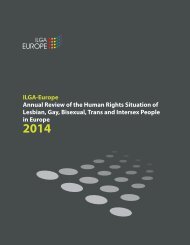Create successful ePaper yourself
Turn your PDF publications into a flip-book with our unique Google optimized e-Paper software.
„Ando bish thaj dujengo barakko mule<br />
butzhene,sako dyes mulas varikon.<br />
Kothe familia sas shavorenca. Numa roma.<br />
Ando nasvalyipo, ande box, thaj ande mel<br />
mule le majbuth manusha. Januari-februari<br />
sas aba, kanak phendom mura phenyake, te<br />
zhas perdal te dikhas kodolen kasa avilomtar<br />
andar o Büko, thaj andar o<br />
Simontornya. Nas aba khonyik kothe,<br />
numa jekh cinyi shej kon murajvelas.”<br />
Hódosi Magdolna<br />
Ando Sopronperesztego beshlam. Mure dades<br />
ando septemberi ingerde butyano slugake,<br />
kanak kaj le rom, o angluno kethane kidipo sas.<br />
Kanak man ingerde aba muri dej nas khere.<br />
Mure dades gelas the dikhel, ke muro dad<br />
iskirindas lake, ke avri ingren len ando Nyam -<br />
cicko Them. Deshujekh phrala sas man, me<br />
somas e majbari. Deshusho bershengi somas,<br />
muro cino phral ijja shonengo sas, sorro ratyi<br />
ande muri angalyi inkerdom les, te na rovel.<br />
Trin chaso shaj sas kanak marde e fejastra.<br />
Avri vorbij, koni kodo. Phenen le shingale.<br />
44 november 3 sas. Pushen le shingale, andre<br />
shaj zhas? Andre avile. Pushen, kaj kerdam<br />
butyi, me phenav o gavesko anav, kaj atunchi<br />
phiras ropaj taj kolompiri te kidas. Pala kode<br />
phenel o shingalo variso xasajlas kothe. Te na<br />
tumen chorden les atunchi khere shaj aven. Tele<br />
shutom le cines andar muro vast ke aba sutastar.<br />
Mure phrala pale rovnas thaj garagyuvenas pen<br />
telaj perina, man pale ingernas le shingale.<br />
Kothe avri aba sar bizhene sas. Duj romani shej<br />
80<br />
„A huszonkettes barakkban rengetegen<br />
meghaltak minden nap. Ott fôleg családok<br />
voltak, gyerekekkel. Csak romák.<br />
A betegségbe, az éhségbe, a koszba haltak<br />
meg leginkább. Január-február táján mondtam<br />
az unokatestvéremnek, hogy menjünk<br />
át, nézzük meg, hogy vannak, akikkel jöttem,<br />
a bükiek, toronyiak.<br />
De senki nem volt már meg.<br />
Egyetlen egy volt meg, akkor haldoklott,<br />
egyetlen egy kislány.”<br />
Hódosi Magdolna<br />
Sopronperesztegen éltünk. Édesapámat már<br />
szep temberben elvitték munkaszolgálatra, mi -<br />
kor a romáknál az elsô összeszedés volt. Mikor<br />
engem elvittek, már édesanyám sem volt ott -<br />
hon. Apámat ment meglátogatni, mert apám<br />
írt neki, hogy kiviszik ôket Németországba. Ti -<br />
zen egy testvérem volt, én voltam a legnagyobb.<br />
Tizenhat éves múltam, a kisöcsém kilenchónapos.<br />
Egész éjjel az ölemben csicsíjgattam, hogy<br />
elmaradjon.<br />
Három óra lehetett, megverték az ablakot.<br />
Ki szólok, ki az. Mondják, hogy csendôrök.<br />
Negy vennégy november harmadikán. Kime -<br />
gyek. Kérdik a csendôrök, hogy bejöhetnek-e.<br />
Bejöttek. Kérdik, hogy hol dolgoztunk, én meg<br />
mondom annak a falunak a nevét, ahova éppen<br />
eljártunk répát, krumplit szedni. Erre azt<br />
mondja, hogy valami ott elveszett. Ha nem ti<br />
loptátok el, visszajöhettek. Letettem a kicsit a<br />
kezembôl, elaludt, a többi testvéreim sírva el -<br />
búj tak a dunyha alá, engem meg kikísértek a<br />
‘In barrack number twenty-two, many people<br />
died every day. There were only families<br />
with children. Only Roma.<br />
Most of them died because of illnesses,<br />
hunger and dirt. In January or February, I<br />
told my cousin to go over and see how the<br />
others are, those that I had travelled with,<br />
those from Bük, and Torony.<br />
But none of them lived.<br />
Only one of them was there,<br />
she was dying, only one little girl.’<br />
Hódosi Magdolna<br />
We were living at Sopronpereszteg. My father<br />
was taken to forced labour service in<br />
September, when they collected the Roma. By<br />
the time they took me, my mother was not at<br />
home either. She went to visit my father,<br />
because my father had written to her that they<br />
would take them to Germany. I had eleven<br />
brothers and sisters, I was the oldest. I had<br />
turned sixteen, my little brother was nine<br />
month old. All night I was trying to lull him to<br />
sleep in my lap, so he would keep quiet.<br />
It was about three o’clock when they<br />
knocked on the window. I asked who it was.<br />
They said, ‘the gendarmes’. It was on the third<br />
of November in forty-four. I went out. The gendarmes<br />
asked me whether they could come in.<br />
They came in. They asked me, where we were<br />
working and I told them the name of the village<br />
where we picked the carrots and potatoes then.<br />
Then he said something was missing from that<br />
village. ‘So if it was not you who stole it, you



